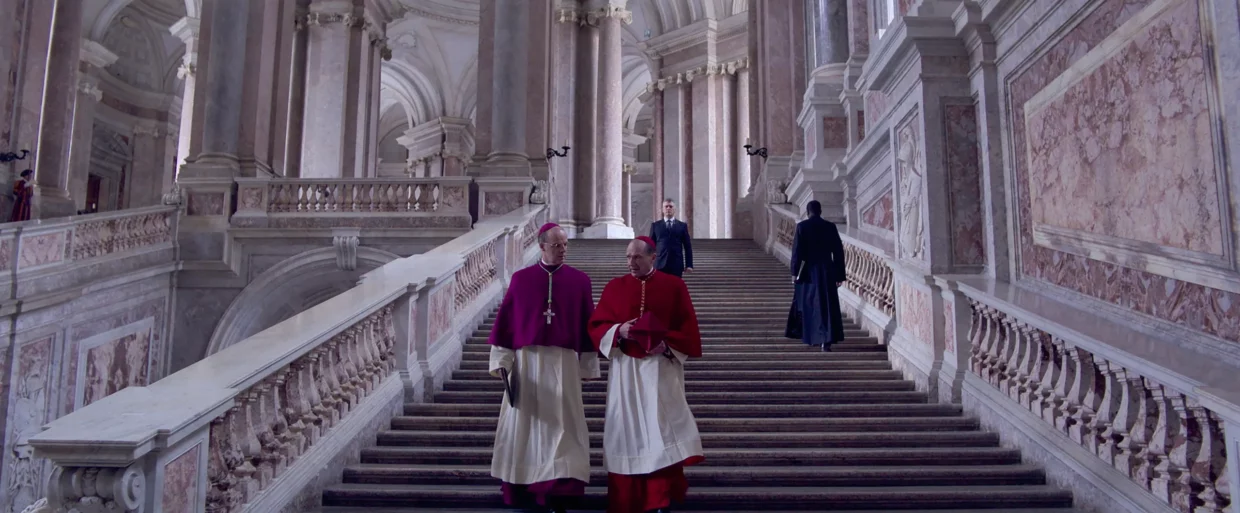
There is a remarkable moment in Edward Berger’s film Conclave in which Cardinal Thomas Lawrence, the Dean of the Conclave of Cardinals assembled to elect a new Pope, sits on the dead pope’s bed, having broken the seal into the holy man’s private chamber to search for evidence of financial malfeasance in the church. On the nightstand of this recently departed man, the most powerful figure in the Catholic church, is an open bible, and on it is a pair of modest reading glasses, mended with tape at the bridge. Lawrence picks up the glasses, holds them close, and his eyes fill with tears. After days of political machination, subterfuge, strategy, plot twists, the simple personal effect cuts to the core of human emotion: Lawrence feels orphaned. His mentor, his father figure, the man he prized and idolized, is gone, and Lawrence, inconsolable, breaks into sobs.
Does this moment of pure, unadulterated grief shake Lawrence into horror at what the papal election has become? At how every player in this complicated, well constructed political drama – the good guys, the bad guys, and everyone in between – has betrayed his principles? At how the vacuum, the power grab, has made all of them into “small, petty men” as one of the other Cardinals says later in the film? After his sobs subside and he finds his emotional bearings, he continues with the search, finding the incriminatory document.
I watched Conclave with great interest. Not just because it is a phenomenal film–not a false note in the script, not a less-than-masterful performance in sight, breathtaking acting, scenery, and costumes–but because I’ve been there. I’ve been at faculty meetings in which Deans were elected, in which new faculty members were appointed, in which colleagues were voted tenure. So I have some <ahem> lived experience </ahem> in the area of putting a group of homo sapiens in a scenario where ambition plays a role, where social advantage is conveyed, and where different values and considerations play a part in sectarian divisions. There is nothing unique about the Conclave: yes, there is ridiculous ceremony and arcane trappings, but aren’t there always ritualized elements in every human encounter? We are interested in these scenarios of group dynamics behind closed doors–jury deliberation is another one–because we have a sense of the major issues that animate these scenarios.
Here are some of the issues that play out, in sophisticated ways, in Conclave. Does the election to an eminent post take into account the personal virtue, the worthiness, of the individual, or is it more important to prioritize a more general policy, or set of values, and then pragmatically select the person who can realistically win office and hold it? How deep (and how low) should we go when inquiring into a person’s past conduct, and how long a memory should we have when assessing, wholesale, a person’s lifetime of goodness? When malfeasance comes to light, who should do the exposing, and how much room must we leave for personal dignity? Is it fair to say that anyone who aspires to high office should be automatically disqualified because aspiration, itself, is a negative trait? At what point does the election start serving the administrative, ritual machine, rather than the ethereal values that the machine is supposed to serve?
Each of the central characters in the film faces these difficult questions and ends up with a different resolution–and almost everybody comes up short. Some are cruder, easier cases. Tedesco, the reactionary Archbishop of Venice, makes every situation into a cudgel to beat his credo into everyone around him. Tremblay, a Canadian liberal cardinal, sees the election as a purely self-motivated power grab and does not shy from lying, stealing, and bribing. Adeyemi, a Nigerian cardinal with conservative views, is nonetheless happy to ride on the wings of diversity until a secret from his past comes to light and then he is seized with fear and begs for secrecy. Bellini, an Italian-American liberal, cares more about steering the church into a more tolerant 21st century than about his own candidacy, and is willing to overlook a lot of moral inadequacies to advance the goal. Even the main protagonist, Lawrence–a fundamentally decent man but no one’s patsy–who exhibits remarkable courage and astuteness as he navigates this complex political landscape–gets tempted, for a brief moment, by the dark side. Having not wanted the papacy at all, he is hell-bent on rooting out corruption and sin, until a window of opportunity briefly opens for him. Earlier in the film, Bellini tells Lawrence that every Cardinal has already secretly picked the name by which he would like to be known as Pope, and Lawrence replies: “I haven’t.” But when the Conclave machinations suddenly thrust Lawrence into a situation where he has a realistic shot at the papacy, he quietly admits to Bellini: “John. . . I would choose John.”
What happens at the end sheds a lot of darkness and light on the proceedings, and I won’t spoil it here. It is a masterpiece that can teach us all about the heaven and hell that we can put each other through when egos get in the way, raising the complicated questions whether full divestment from ego is ever possible.




1 Comment
The ending isn’t important. I found it predictable and boring, but it didn’t make the film a bit less great. I agree about the moments you highlight; they’re indeed highlights, and the subtlety there – including in directorship, camera and acting – are a contrast to the scene with the deus ex machina, as it were: seemingly blunt, but first confusing the viewer. It worked and was legitimate.